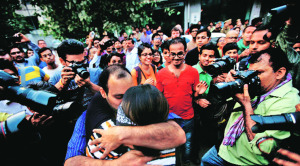Young India rises with a protest against public show of affection
Protesters in Delhi
It all started in Kochi, Kerala a Facebook campaign called the ”˜Kiss of love’ by the youth across Kerala to participate in a protest against moral policing on November 2 at Marine Drive, Cochin.
The movement received widespread support with more than 110000 likes for the Facebook page. It also received opposition and critisicm from a part of the society and various religious and political groups, including Bharatiya Janata Yuva Morcha, SDPI, Vishva Hindu Parishad, Shiv Sena, Bajrang Dal and Ernakulam wing of Kerala Students Union. These opposing groups claimed that public display of affection is against both Indian culture and law of the land undersection 294 of the Indian Penal Code, even though both the Supreme Court of India and Delhi High Court have made it clear that kissing in public is not an obscene act and no criminal proceedings can be initiated, for kissing in public, through landmark judgments.
The Kiss of Love protest was sparked in October 2014, when Jai Hind TV, a Malayalam news channel owned by Indian National Congress, telecast an exclusive report on alleged immoral activity at the parking space of Downtown Cafe in Kozhikode. The video showed a young couple kissing and hugging each other. A mob of attackers, who were later identified as belonging to Bharatiya Janata Yuva Morcha vandalized the cafe following the report. Activists from all over Kerala decided to protest against the series of moral policing incidents by organizing a public event at Marine Drive beach on November 2 in Kochi.
The movement finally spread to all over India with protests organised by students at University of Hyderabad, JNU Delhi, IISER Kolkata and IIT Bombay, Jadavpur University and Presidency University, Kolkata. Delhi saw its own scuffle at a protest organised by the campaigners when right wing Hindu Sena members turned up at the scene on November 8.
Members of the right-wing political group Hindu Sena, known for its “moral policing”, are so infuriated by kiss of love protest in the capital that they have publicly threatened to rape the protest organisers! Media reported that Hindu Sena members branded hundreds of students who took part in the kissing event as “un-Indian”.
The campaigners, mostly students and activists turned up around 4 pm and began sloganeering against the “Love-Jihad bogey” and moral policing.
“If conservative elements can capture our public spaces and impose their diktat on us, we will do the same in retaliation. Our university spaces, parks and roads are not free any more. We are reclaiming them now. We live in an age where a Dalit man is hacked to 40 pieces because he fell in love with a woman from a higher caste. This Kiss of Love campaign is a defiance of moral policing and a struggle to uphold the spirit of love in all its forms and for everyone,” Zareen, a campaigner, said.
Youths hugged and kissed each other to the background score of Bollywood songs celebrating love and freedom. Soon Hindu Sena members arrived on the scene and protested that the “Western culture was corrupting and degrading Indian culture”. They got into a scuffle with the Kiss of Love campaigners a couple of times and police too joined the fray. Campaigners staged a sit-in at Rani Jhansi roundabout and blocked traffic for over an hour. “Paschami sabhyata (western culture) is degrading our cultural ethos. We are not against borrowing the good from the West. But why take the bad? The bad things take no time in spreading while the good things takes years to inculcate. Our sisters and our daughters will fall prey to these corrupting influences,” Sachin Goel, a student, said. Additional Commissioner of Police (Central) Alok Kumar said, “There were around 70 to 80 campaigners at the venue. We detained 70 persons for a brief period at Paharganj police station.”
Mark Brown, a student of University College London who is on an internship in Delhi, said, “Indian culture is too varied and complex to say something as sweeping as Western culture is influencing it in a bad way. There should be space to allow one to borrow whatever he or she likes from a particular culture. It is all about assimilation.”
Short URL: https://indiandownunder.com.au/?p=4070


